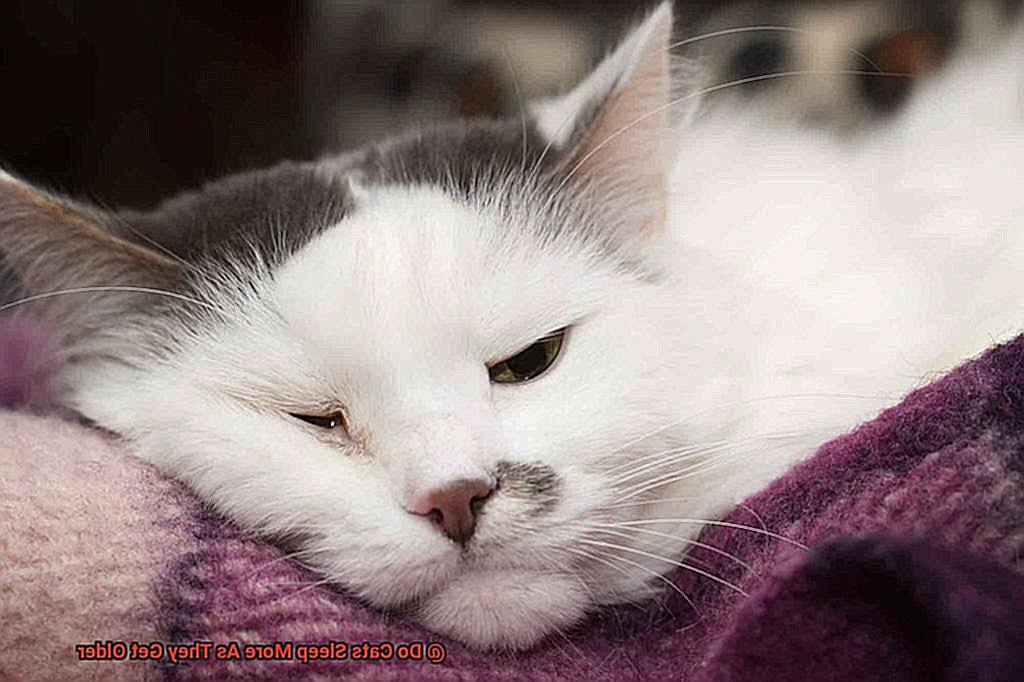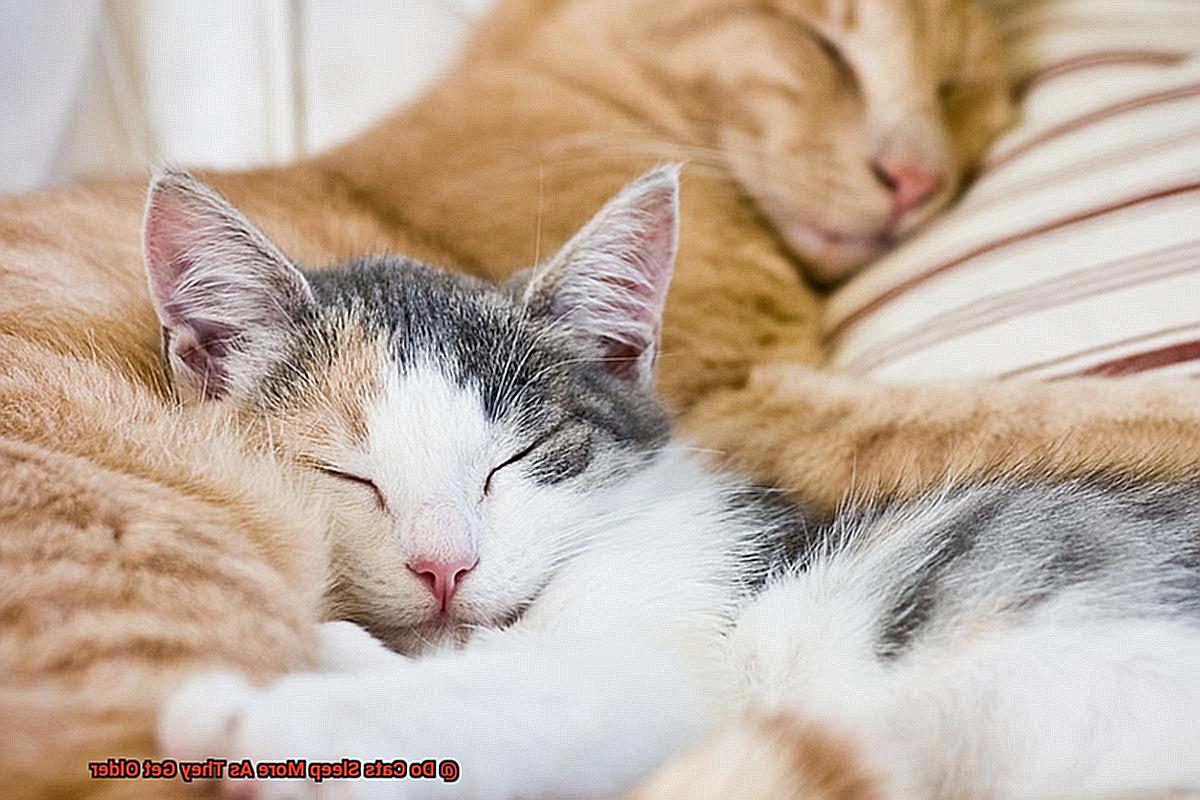Do cats sleep more as they get older? It’s a question many cat owners have.
The answer is yes! Cats do tend to sleep more as they get older. But there are other factors that can influence how much kitty snoozes.
In this blog post, we’ll explore why cats sleep better as they age, what other factors affect their sleeping habits, and how you can make sure your senior cat gets enough rest.
We’ll also discuss the importance of providing a safe environment for your elderly feline friend.
So let’s dive in!
How Much Do Cats Sleep?
Do you know how much sleep cats need? It may surprise you to learn that cats can sleep up to 16 hours a day! However, the amount of sleep they require is dependent on their age, size, and activity level.
Kittens and younger cats tend to need more rest than older cats. Senior cats may also require more sleep due to age-related health issues. Cats can also enter periods of deep sleep known as catnaps. These catnaps can last anywhere from 10 minutes to several hours, depending on the cat’s needs.
Cats are highly intelligent creatures who need plenty of exercise and rest in order to stay healthy and happy.
Make sure your feline friend is getting enough shut-eye by providing them with a comfortable place to snooze.
Do Cats Sleep More As They Get Older?
The answer is a resounding yes! As cats age, their metabolism slows down, and they don’t need as much energy. This means more naps and longer snoozes are inevitable. An 11-year-old cat is considered old and can sleep up to 16 hours a day.
If your cat is sleeping more than this, it could be a sign of an underlying health condition, so it’s important to take them to the vet for a check-up.
You can also help keep your kitty active by providing toys, engaging in playtime, and giving them treats or food puzzles. Even as they get older, these activities will help keep your furry friend looking fresh and alert.
At What Age Do Cats Sleep More?
You may have noticed them snoozing more often than usual. This is completely normal! As cats age, they tend to sleep longer and more often. Typically, cats will begin sleeping better around age 8 to 9, and can even sleep up to 16 hours a day.
It is important for cat owners to keep an eye on their pet’s sleeping habits. If there is a sudden change in their pattern, it could be a sign of an underlying health issue, so it’s best to take them to the vet right away.
To ensure that your kitty gets enough restful sleep, provide them with a comfortable and safe sleeping environment. Make sure the temperature is just right for extra warmth, and consider buying some cozy blankets and pillows for them.
Why Is My Cat Sleeping So Much All of a Sudden?
Stress, illness, age, and boredom are all potential causes of your cat’s sudden need for extra sleep.
Stress is one of the primary reasons cats may be sleeping more. If there have been any changes in their environment or routine recently, they may become stressed out and seek extra sleep as a way to cope. Illness is another factor that could lead to an increase in sleep. When cats are sick, their bodies require extra rest in order to fight off the disease.
Age can also play a role in why cats are sleeping more often. As cats get older, their metabolism slows down and they become less active, which leads them to sleep more frequently. Additionally, boredom can cause cats to take longer naps if they don’t have enough stimulating activities or toys available for them to play with.
If you suspect your cat’s sudden increase in sleep could be due to one of these factors, make sure you bring them to the vet for a checkup just in case! In the meantime, try providing your cat with some fun activities or toys that will keep them entertained and help reduce stress levels.
Should I Let My Cat Sleep All Day?
Are you considering letting your cat sleep all day? Well, the answer is a resounding no! Cats are naturally active animals and need plenty of exercise and stimulation to stay healthy. Excessive sleeping can be a sign of illness or depression, so if your cat is sleeping more than usual, it’s best to take them to the vet for a checkup.
To ensure your cat doesn’t get bored and start sleeping too much, it’s important to provide them with plenty of toys and activities. Providing a scratching post, climbing tree, or other interactive toys can help keep your cat engaged and active throughout the day.
Is an 11 Year Old Cat Considered Old?
Although cats typically have a lifespan of 12 to 15 years, 11 is still considered old.

As cats age, their bodies become increasingly fragile and more susceptible to health issues. Common ailments for older cats include arthritis, heart disease, kidney disease, diabetes, and cancer. Elderly cats are also more likely to suffer from cognitive decline and dementia.
It is essential to take your senior cat to the vet regularly for checkups and screenings in order to ensure that any health problems are caught early and treated promptly.

Additionally, make sure your elderly cat gets plenty of rest—they need more sleep than younger cats due to their aging bodies!
So if you have an 11-year-old kitty at home, keep in mind that they are entering their golden years.
Tips For Keeping Your Cat Healthy and Alert
Exercise and Playtime
Exercise is essential for cats to be healthy and alert, so make sure your feline friend has plenty of opportunities to move around. Encourage your cat to play, run, and explore their environment each day.
To keep them engaged, provide catnip mice or laser pointers, as well as interactive games such as hide-and-seek or fetch.
Not only will regular playtime help keep your cat active and alert, but it will also give them a way to express themselves.
Balanced Diet
Having a balanced diet is key to keeping your cat healthy and alert. Make sure their meals are rich in vitamins and minerals that are appropriate for their age and fitness level.
Don’t forget to provide fresh water throughout the day, as dehydration can lead to serious health issues in cats.
Avoid giving too many treats or snacks as this can lead to obesity, which can cause long-term health problems.
Maintaining Your Cat’s Health and Alertness
To keep your cat healthy and alert, make sure their environment is clean and comfortable, with plenty of soft bedding for them to rest in if needed. Minimize stressors in the home such as loud noises or unfamiliar people or animals that could disrupt their sleep patterns or cause anxiety. Provide toys, scratching posts, or other items that will keep your cat engaged while still stimulating their minds so they don’t get bored or sleep too much during the day.
Mental Stimulation
Provide toys that encourage problem solving, such as puzzle feeders or interactive games like hide-and-seek or fetch; these activities not only provide mental stimulation but also exercise at the same time.
This will help ensure that your cat stays healthy and alert by providing them with an outlet for physical activity as well as mental stimulation on a daily basis.
Veterinary Visits
Regular vet visits are essential for keeping your cat healthy throughout their life span—take them at least once a year so any health problems can be identified early on before they become more significant issues later in life.
Vaccinations are also vital in preventing diseases that could potentially be fatal if not handled quickly by a veterinarian; make sure you keep up with these regularly.
Common Health Problems in Aging Cats
As cats age, they can experience a variety of health issues. Common problems in aging cats include kidney disease, arthritis, diabetes, hyperthyroidism, cancer, and dental disease.
Kidney disease is caused by age-related degeneration of the kidneys and can cause increased thirst and urination, weight loss, vomiting, and decreased appetite. Arthritis causes stiffness or lameness as well as pain when walking or jumping.
Diabetes results in high blood sugar levels, which can lead to weight loss, dehydration, and an increase in urination.
Hyperthyroidism occurs when the thyroid gland produces too much hormone, which can cause weight loss despite an increased appetite.
Cancer is a serious health problem for older cats. However, it can be treated with chemotherapy or surgery if caught early enough.
Dental disease is also common in older cats and can lead to pain while eating as well as bad breath. Regular brushing of the teeth can help prevent this issue from developing or worsening.
If your cat is getting older, it’s important to recognize these common health problems so you can get your pet the care they need.
Also Read: Do Cats Sleep More In Hot Weather?
Conclusion
As cats age, it is perfectly normal for them to require more restful sleep.
However, if you notice a sudden change in their sleeping habits, this could be an indication of an underlying health issue and should be addressed by your veterinarian right away.
To ensure that your cat gets enough shut-eye, make sure they have a warm and safe environment with plenty of blankets and pillows to snuggle in.
Additionally, provide stimulating activities such as toys, playtime, and food puzzles throughout the day to keep them alert and active.
Regular vet visits are also important for detecting any potential health issues before they become more serious.
Caring for an elderly cat can be both challenging and rewarding.







